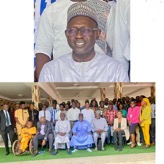
He said journalists bear a tremendous responsibility in shaping public perception, disseminating information, and contributing to the democratic discourse. In an era of technology, he cautioned, information travels and misinformation can spread like wildfire.
“The need for journalistic integrity has never been more pronounced,” he highlighted, saying journalists doing research, fact-checking, and presenting well-rounded narratives is vital.
He further reiterated: PURA is not here to infringe on the creativity of the media but rather to empower you with the tools you need to thrive within the regulatory framework.
The chairman of the Media Council of the Gambia, Babucarr Cham, said the broadcasting media need to be empowered sufficiently to enhance proper standards of audio streaming and conduct.
All nations have a common denomination that says that truth, accuracy, and objectivity, undoubtedly remain the cornerstone of journalism ethics and the decision of the Council relies on the media code of ethics named the Cherno Jallow Charter of Ethics for Journalists.
Chairman Cham said the Media Council of The Gambia set out several issues of concern which are to instill the culture of self-regulation within media houses, which is a guideline in dealing with complaints.
Minister of Information, Lamin Queen Jammeh, for his part, said that people's behaviours were moulded through the information they hear, and if they wanted to measure the level of development in the information value chain, they were not expected to look at the tangible development asset but rather at the behaviours of individuals in the society they look at, then they would understand the level of development in a democratic state.
The Information minister also states that information is the lifeblood of every democratic society.
The Director of Legal Licensing and Enforcement of PURA, Emma Mendy, said media regulation requires much more than just setting the best laws and policies.
She also highlighted the task of overcoming the challenges of what comes with regulations in the context of Africa and young democracies all over the world while upholding regulatory confidence in their processes.
She further challenged media houses and the public to be mindful of the stories they share and broadcast and also challenged PURA and the government to be intentional and thoughtful about regulatory practices they normalise and perpetuate.


